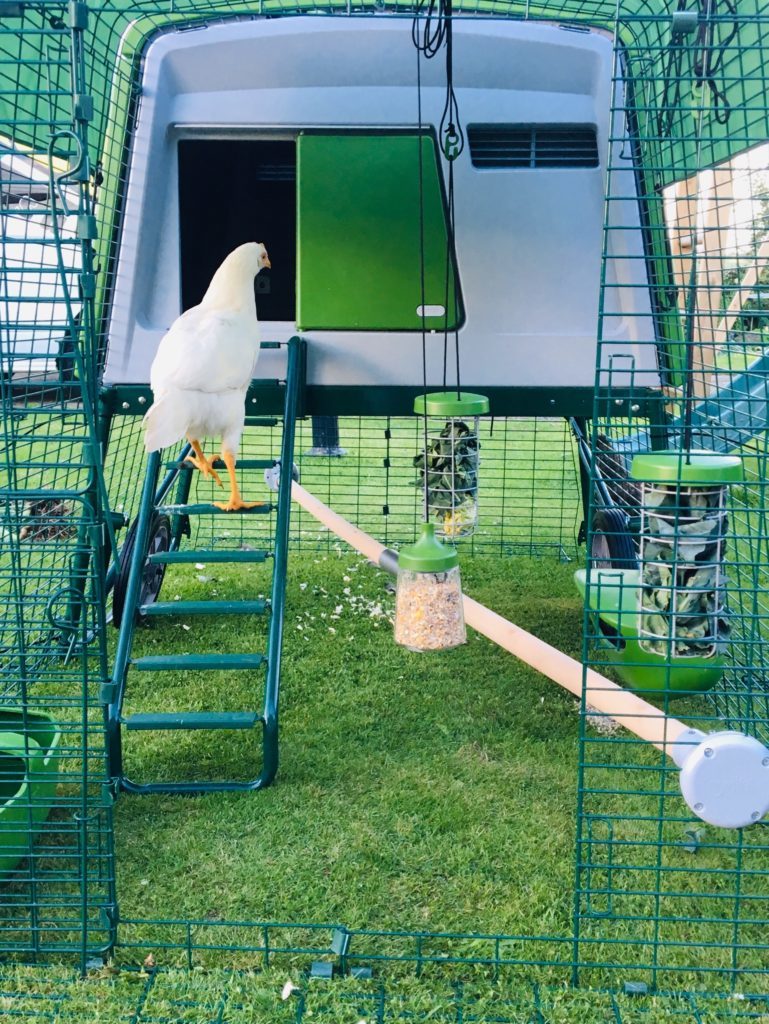Moving House with Chickens
Moving house is stressful for everyone involved – and that includes pets and chickens. As far as your hens are concerned, the secret to a successful relocation is to have everything ready at the other end. In the same way as you might unpack a kettle and two mugs before opening any of the big boxes, the chicken shed and run should be ready in the garden before the first kettle boils!
Hens are prone to stress, and at the very least you can expect the egg count to plummet for a few days following a move. Weak or very nervous chickens are in particular danger, as panic can make them flap blindly and break legs, or even kill themselves. Minimising stress is therefore the key to a successful move.
The most stress-free way to get your hens ready for the move is to collect and crate/box them from the coop, rather than later in the day when they are out and about and need chasing and cornering. That is not a good way to minimise stress!
 Transporting Chickens
Transporting Chickens
Your hen-carriers need to be covered, well-ventilated boxes or pet crates. They should have enough space for the birds to turn around in (to prevent them from panicking at the confined space), while being dark enough to make their instincts kick in and help them snuggle down for the duration of the trip. On longer journeys, however, you will need to have enough light in the boxes to enable the hens to feed, and pet crates will make this easier.
You’ll need one box per chicken, generally, so make sure you have enough boxes for the big day. Hens with similar, placid temperaments can be transported in a single box. Each box or crate should be lined with straw to soak up the droppings, and the boxes should be stacked securely, not more than three boxes high.
It’s important that the birds don’t get too hot on the journey, so ventilation is an issue. If you only have two or three hens, they could travel on the back seat of a well-ventilated car, secured with quilts or blankets – or even seatbelts – to prevent the boxes from sliding around.
The journey itself should be taken using as many straight, non-bumpy roads as possible, combined with the need to make the trip as brief as you can. If your new home is a short stretch of motorway and a couple of A-roads away, that’s all very straightforward. Rural locations with lots of windy-road options will need more planning. If all the roads are B-roads with lots of bends, the quickest route is the best option.
In the two weeks before the move, make sure your hens’ diet is rich in all the required vitamins and minerals. Some owners recommend adding probiotics or extra vitamins to the feed, and this is something you should discuss with your vet.
For short journeys, you will not have to worry about chicken feed. On longer trips, though, food will need to be provided. Make sure you take a long break at least every three hours, to allow the confined birds to settle down and feed. If you are transporting the hens in crates, you can attach a water dispenser to the side.
A Portable Chicken Coop?
Old fashioned chicken coops can be tricky to transport, and many hen keepers prefer to erect a new run and chicken shed at their new property. This sometimes involves housing the birds in temporary accommodation while the new coop and run are being sorted out.
There are ways of avoiding the inconvenience, though. A portable coop and run can be packed away and then installed in the new garden in a few minutes, and they have the advantage of familiarity. Hens introduced into a coop that they already know inside out will reduce the stress of the move enormously.
Coops and runs such as the Eglu are ideal in this respect. Placing the coop in your new garden as soon as you arrive will enable the chickens to feel at home before you’ve even managed to open any of your removal boxes. Human will inevitably feel the stress of the moving-in process, but the hens don’t have to!
The process isn’t quite over when your hens are safely cooped up in the new garden. Stress can cause any underlying diseases to bloom, so you need to carry out daily health checks on your birds as the flock settles down in its new surroundings. This is yet another reason to consider a pack-and-go portable coop and run.
This entry was posted in Chickens
